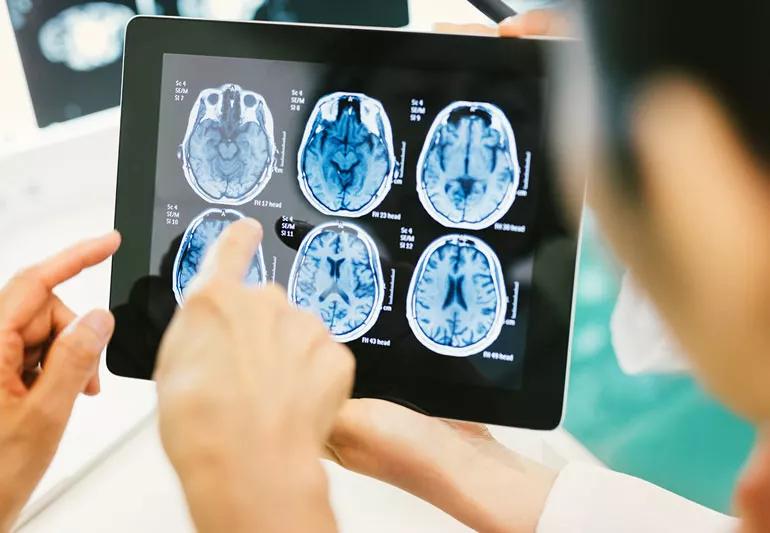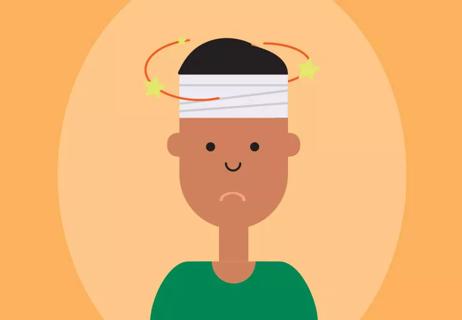Know the warning signs, what to do and what not to do

Between 1.6 and 3.8 million concussions are believed to occur across the United States each year. Thankfully, an increased awareness has prompted an increase in diagnosis of concussive injuries.
Advertisement
Cleveland Clinic is a non-profit academic medical center. Advertising on our site helps support our mission. We do not endorse non-Cleveland Clinic products or services. Policy
But what exactly is a concussion?
“It’s a short-lived functional brain injury typically caused by a bump or blow to the head,” explains concussion specialist, Richard Figler, MD. “A concussion sets off a chemical process in the brain as it’s trying to heal itself. During that process, and depending on what part of the brain was impacted, it can affect different functions like balance, memory, focus or even cause visual disturbances.”
There’s also usually a neck component when it comes to concussions. When you hit your head, the neck can take on some of that force as well.
If you’ve been diagnosed or suspect that a friend or family member has a concussion, treatment — including physical and mental rest — should start right away. Don’t wait to seek help from a medical professional with expertise in evaluating and managing concussions.
Signs and symptoms of a concussion can occur immediately, hours or even days after the initial “hit” or fall. Symptoms can change over time, depending on activity level and with other potentially associated injuries, making them difficult to recognize and manage.
“Only about 5 to 10% of people who get concussions will experience loss of consciousness,” says Dr. Figler. “Loss of consciousness does equal a concussion, but not having loss of consciousness does not mean you didn’t have a concussion either.”
Advertisement
Anyone experiencing or demonstrating any of the following sign and symptoms after suffering a direct blow or jarring contact with their head or body may have a concussion and should be evaluated by a healthcare provider.
Because more concerning problems can arise in the first 24 to 48 hours after a head injury, anyone suspected of sustaining a concussion should be monitored for worsening symptoms.
If you have any concerns or notice any of the following warning signs after a head injury, always seek medical attention immediately.
Since there’s such a wide range of symptoms, doctors use an array of tests to evaluate, monitor and diagnose a concussion.
“We’ll test everything from checking their balance, to their reaction time, to some in-depth neurocognitive tests,” says Dr. Figler. “But every evaluation will include a graded symptom checklist and then an exam to make sure that there’s nothing lurking that we don’t outwardly see.”
Other tests can include: eye movement and function testing, a cervical spine exam and a thorough neurological exam to make sure there’s nothing underlying that might warrant further imaging or testing down the road.
Follow these tips to start the healing process after a concussion:
Advertisement
Steer clear of these things to optimize your recovery:
Advertisement

Sign up for our Health Essentials emails for expert guidance on nutrition, fitness, sleep, skin care and more.
Learn more about our editorial process.
Advertisement

Yes, there is a connection between this injury and disease, and not just for athletes who play high-impact sports

The short answer from a concussion specialist

Watch for severe symptoms in older kids and adults, but kids under age 2 should always see a provider

Concussion protocol describes the steps needed to test for concussion and return to play — timelines vary

Repeated trauma over time can have a cumulative effect

Act quickly by locating the object, gently removing the debris and flushing your eye

Most oropharyngeal cancers can be traced to a virus that can be shared during oral sex

Track your blood sugar levels and pay attention to any symptoms, like feeling thirstier than normal

Even small moments of time outdoors can help reduce stress, boost mood and restore a sense of calm

A correct prescription helps your eyes see clearly — but as natural changes occur, you may need stronger or different eyeglasses

Both are medical emergencies, but they are very distinct events with different causes